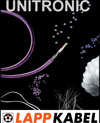

The importance of cable properties.
Introduction
Data cables for automation and robotics industrial applications have to meet specific electrical, mechanical, chemical and thermal requirements.
The aim is to use sophisticated technology/products in non-industrial areas (eg, network technology) for industrial applications where critical environmental conditions occur, ie, torsion, reversed bending and mechanical stress.
Consequently cables for these applications must have a special make-up to meet the requirements. A long service life is the ultimate goal.
Application areas
First of all we differentiate simple requirements and more complex configurations. In the following we only want to look at more complex configurations, such as:
* Bus systems.
* Robotics.
Cables for bus systems and robotics are far more loaded than other cables for data communication. Consequence: cable properties which exceed average specifications are required for reliable operation.
Key considerations
Now we go into detail and look at different parameters which make cables suitable for industrial application:
Cable make-up
The cable make-up is decisive in determining whether a cable is suitable for application under certain conditions like flexing, torsion, bending, oil resistance, chemical resistance, flame resistance and more, for high frequencies and high transmission rates. Screening requirements also need to be defined to prevent electro-mechanical interferences (EMI).
Insulation and sheathing
Specific insulation materials (eg, TPE, Teflon, polystyrene) enable easy movement of the cores within the cable during continuous flexing, torsion and bending.
The outer sheath material has to withstand harsher conditions in industry, ie, in many cases it has to be highly flexible and has to meet enhanced mechanical, chemical and thermal requirements. Where high flexibility is important very elastic polyurethane outer sheaths are often used.
Mechanical aspects
Besides the mechanical loading capacity of the respective cable surface the kind of cable movement decisively determines service life of cables in an industrial environment.
We differentiate:
* torsion + bending – multi-axis robotics.
* mainly torsion – SCARA robotics (eg, insertion machines).
* mainly bending – linear handling systems (eg, power chains).
Conclusion: Particular requirements require different cable choices for optimal performance.
Electrical aspects
Cables for industrial data communication are selected for a certain application with specific requirements. Electronically controlled systems therefore require fixed electrical parameters such as impedance, mutual capacitance, attenuation and near end crosstalk attenuation (NEXT) to ensure operational security. These electrical values should not change even after millions of bending cycles or torsion movements.
Symmetrical twisted pair cables (TP) are often used to reach EMC (electro-magnetic compatibility). Furthermore, screenings (foil, braiding, wrapping of copper wire) to prevent EMI (electromagnetic interferences) are applied.
Conformity and certification
Among other points the operational security of a system depends on the extent the cable parameters correspond to the parameters of the systems used, i.e. the cable properties should be system compliant.
Cables certified by a neutral institution (third party) offer the advantage for the planner and end-user in that they meet the specific requirements of a system. Thus time and cost consuming inquiries are unnecessary. These cables stand for a certified security.
Hybrid cables
In the narrower sense hybrid cables are the combination of copper cores (mainly for power supply) and fibre optic cores (for data transmission) under one common outer sheath.
Sometimes the combination copper/copper is also named as hybrid cable by planners or end-users to describe a configuration of a cable with cores having different cross sections diameters or AWG sizes.
Trends and facts
Most likely hybrid cables will gain a substantial share in the near future. The reasons are manifold: cost effective cabling; time-saving assembly; higher data transmission rates; broader bandwidths and better prevention against EMI.
Future R&D is going to be challenged to develop accessories and connectors in response to the increasingly sophisticated cable designs that are emerging.
For more information contact Grant Joyce, Lapp Cable, +27 (0)11 201 3213, [email protected], www.lappcable.co.za
| Tel: | +27 11 201 3200 |
| Email: | [email protected] |
| www: | www.lappgroup.co.za |
| Articles: | More information and articles about LAPP Southern Africa |

© Technews Publishing (Pty) Ltd | All Rights Reserved